Modern Ethics and Christian Doctrine
VerifiedAdded on 2020/04/07
|10
|2577
|374
AI Summary
This assignment delves into the complex relationship between Christian ethics and modern societal changes. It explores how traditional ethical principles, often rooted in historical contexts, may be challenged by evolving social norms and individual perspectives. The discussion focuses on identifying potential conflicts between conventional Christian teachings and modern practices, particularly within areas like marriage and family relationships. The goal is to analyze how Christian ethics can be adapted and applied meaningfully in a contemporary world while upholding core values.
Contribute Materials
Your contribution can guide someone’s learning journey. Share your
documents today.
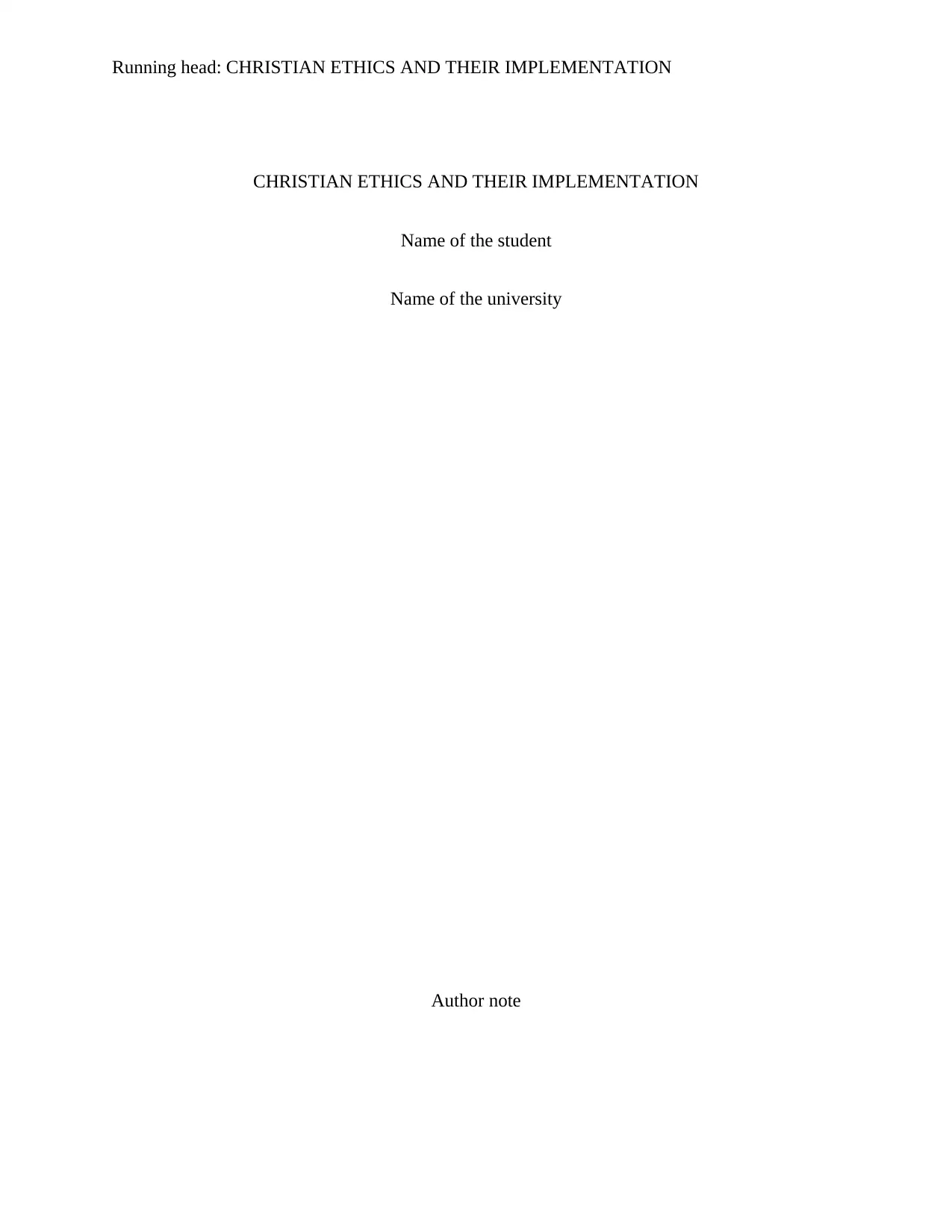
Running head: CHRISTIAN ETHICS AND THEIR IMPLEMENTATION
CHRISTIAN ETHICS AND THEIR IMPLEMENTATION
Name of the student
Name of the university
Author note
CHRISTIAN ETHICS AND THEIR IMPLEMENTATION
Name of the student
Name of the university
Author note
Secure Best Marks with AI Grader
Need help grading? Try our AI Grader for instant feedback on your assignments.
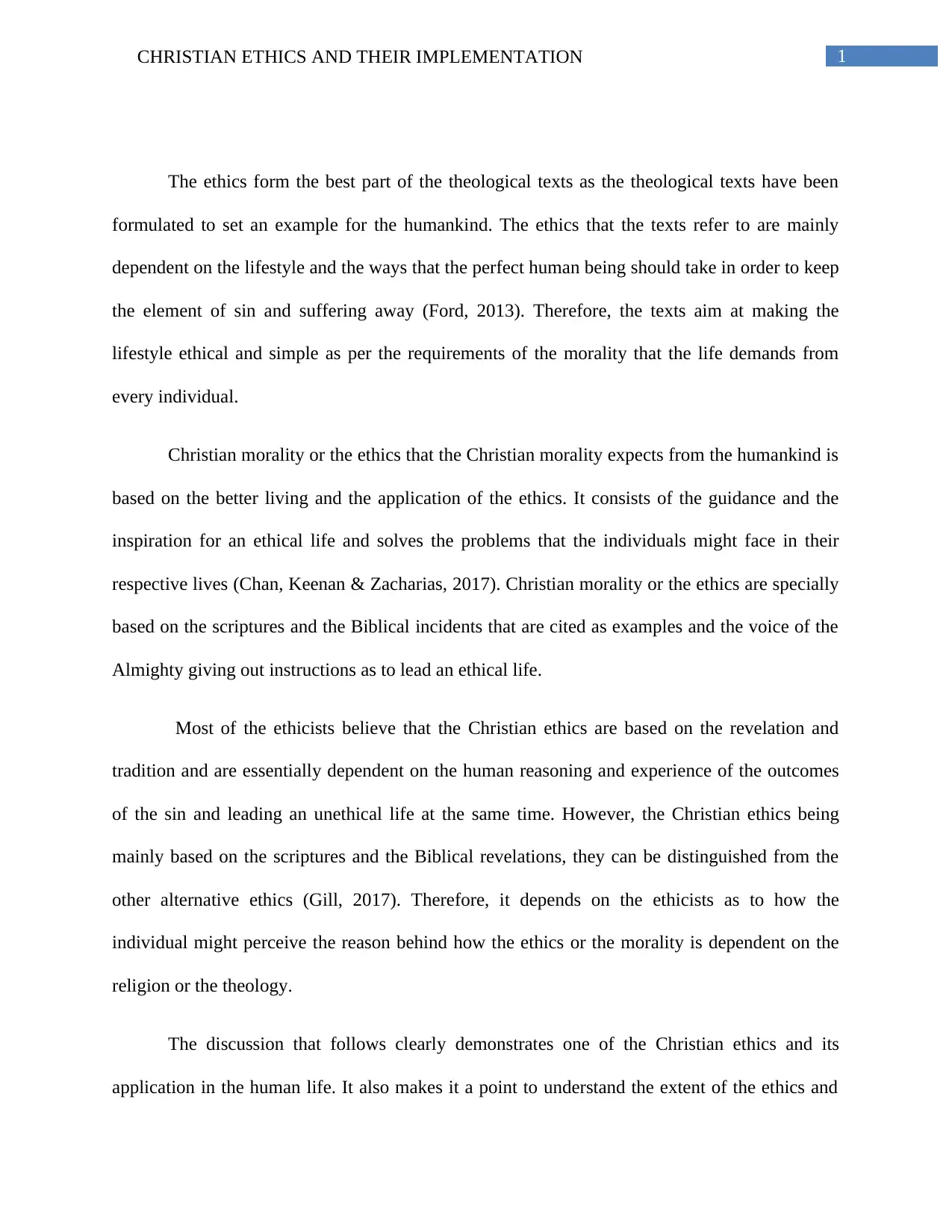
1CHRISTIAN ETHICS AND THEIR IMPLEMENTATION
The ethics form the best part of the theological texts as the theological texts have been
formulated to set an example for the humankind. The ethics that the texts refer to are mainly
dependent on the lifestyle and the ways that the perfect human being should take in order to keep
the element of sin and suffering away (Ford, 2013). Therefore, the texts aim at making the
lifestyle ethical and simple as per the requirements of the morality that the life demands from
every individual.
Christian morality or the ethics that the Christian morality expects from the humankind is
based on the better living and the application of the ethics. It consists of the guidance and the
inspiration for an ethical life and solves the problems that the individuals might face in their
respective lives (Chan, Keenan & Zacharias, 2017). Christian morality or the ethics are specially
based on the scriptures and the Biblical incidents that are cited as examples and the voice of the
Almighty giving out instructions as to lead an ethical life.
Most of the ethicists believe that the Christian ethics are based on the revelation and
tradition and are essentially dependent on the human reasoning and experience of the outcomes
of the sin and leading an unethical life at the same time. However, the Christian ethics being
mainly based on the scriptures and the Biblical revelations, they can be distinguished from the
other alternative ethics (Gill, 2017). Therefore, it depends on the ethicists as to how the
individual might perceive the reason behind how the ethics or the morality is dependent on the
religion or the theology.
The discussion that follows clearly demonstrates one of the Christian ethics and its
application in the human life. It also makes it a point to understand the extent of the ethics and
The ethics form the best part of the theological texts as the theological texts have been
formulated to set an example for the humankind. The ethics that the texts refer to are mainly
dependent on the lifestyle and the ways that the perfect human being should take in order to keep
the element of sin and suffering away (Ford, 2013). Therefore, the texts aim at making the
lifestyle ethical and simple as per the requirements of the morality that the life demands from
every individual.
Christian morality or the ethics that the Christian morality expects from the humankind is
based on the better living and the application of the ethics. It consists of the guidance and the
inspiration for an ethical life and solves the problems that the individuals might face in their
respective lives (Chan, Keenan & Zacharias, 2017). Christian morality or the ethics are specially
based on the scriptures and the Biblical incidents that are cited as examples and the voice of the
Almighty giving out instructions as to lead an ethical life.
Most of the ethicists believe that the Christian ethics are based on the revelation and
tradition and are essentially dependent on the human reasoning and experience of the outcomes
of the sin and leading an unethical life at the same time. However, the Christian ethics being
mainly based on the scriptures and the Biblical revelations, they can be distinguished from the
other alternative ethics (Gill, 2017). Therefore, it depends on the ethicists as to how the
individual might perceive the reason behind how the ethics or the morality is dependent on the
religion or the theology.
The discussion that follows clearly demonstrates one of the Christian ethics and its
application in the human life. It also makes it a point to understand the extent of the ethics and
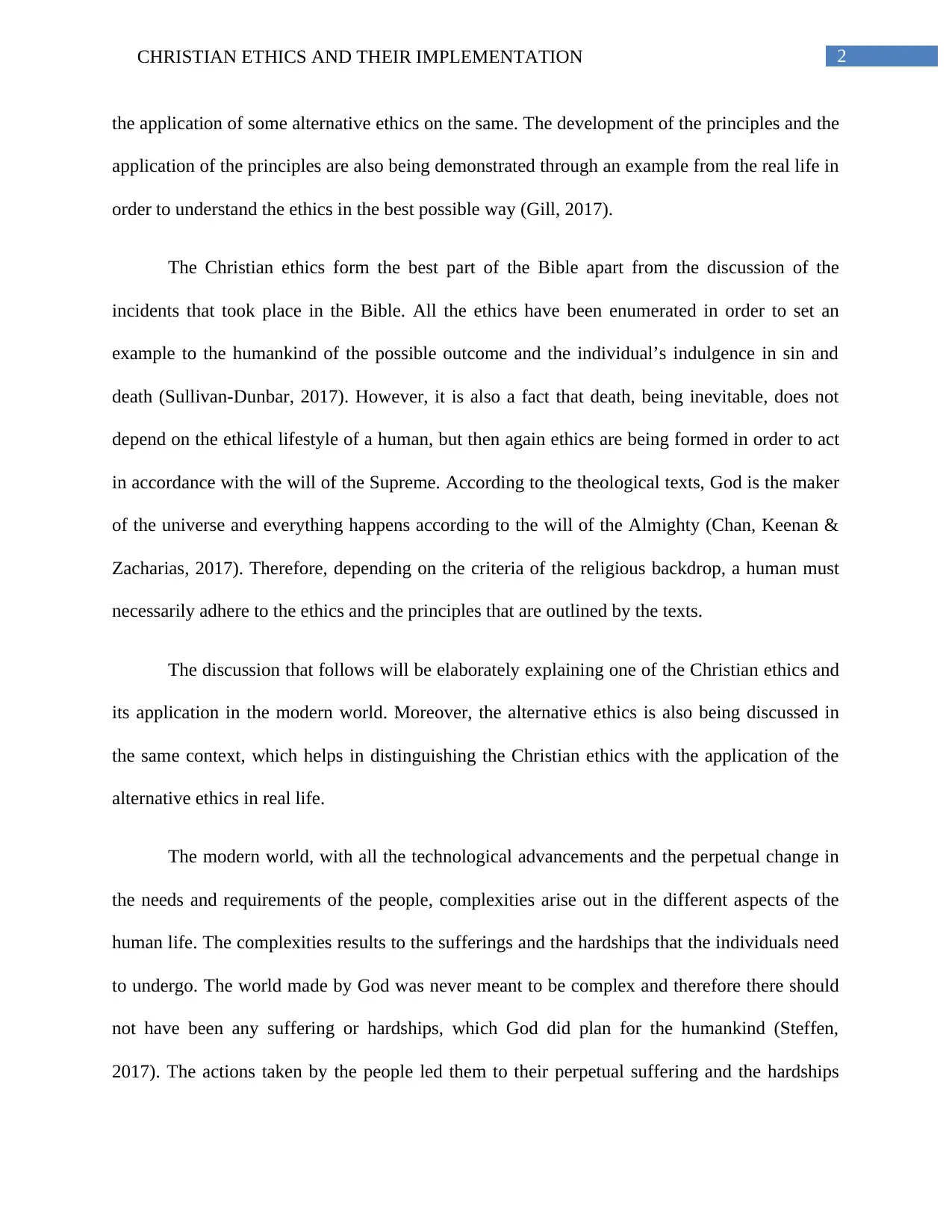
2CHRISTIAN ETHICS AND THEIR IMPLEMENTATION
the application of some alternative ethics on the same. The development of the principles and the
application of the principles are also being demonstrated through an example from the real life in
order to understand the ethics in the best possible way (Gill, 2017).
The Christian ethics form the best part of the Bible apart from the discussion of the
incidents that took place in the Bible. All the ethics have been enumerated in order to set an
example to the humankind of the possible outcome and the individual’s indulgence in sin and
death (Sullivan-Dunbar, 2017). However, it is also a fact that death, being inevitable, does not
depend on the ethical lifestyle of a human, but then again ethics are being formed in order to act
in accordance with the will of the Supreme. According to the theological texts, God is the maker
of the universe and everything happens according to the will of the Almighty (Chan, Keenan &
Zacharias, 2017). Therefore, depending on the criteria of the religious backdrop, a human must
necessarily adhere to the ethics and the principles that are outlined by the texts.
The discussion that follows will be elaborately explaining one of the Christian ethics and
its application in the modern world. Moreover, the alternative ethics is also being discussed in
the same context, which helps in distinguishing the Christian ethics with the application of the
alternative ethics in real life.
The modern world, with all the technological advancements and the perpetual change in
the needs and requirements of the people, complexities arise out in the different aspects of the
human life. The complexities results to the sufferings and the hardships that the individuals need
to undergo. The world made by God was never meant to be complex and therefore there should
not have been any suffering or hardships, which God did plan for the humankind (Steffen,
2017). The actions taken by the people led them to their perpetual suffering and the hardships
the application of some alternative ethics on the same. The development of the principles and the
application of the principles are also being demonstrated through an example from the real life in
order to understand the ethics in the best possible way (Gill, 2017).
The Christian ethics form the best part of the Bible apart from the discussion of the
incidents that took place in the Bible. All the ethics have been enumerated in order to set an
example to the humankind of the possible outcome and the individual’s indulgence in sin and
death (Sullivan-Dunbar, 2017). However, it is also a fact that death, being inevitable, does not
depend on the ethical lifestyle of a human, but then again ethics are being formed in order to act
in accordance with the will of the Supreme. According to the theological texts, God is the maker
of the universe and everything happens according to the will of the Almighty (Chan, Keenan &
Zacharias, 2017). Therefore, depending on the criteria of the religious backdrop, a human must
necessarily adhere to the ethics and the principles that are outlined by the texts.
The discussion that follows will be elaborately explaining one of the Christian ethics and
its application in the modern world. Moreover, the alternative ethics is also being discussed in
the same context, which helps in distinguishing the Christian ethics with the application of the
alternative ethics in real life.
The modern world, with all the technological advancements and the perpetual change in
the needs and requirements of the people, complexities arise out in the different aspects of the
human life. The complexities results to the sufferings and the hardships that the individuals need
to undergo. The world made by God was never meant to be complex and therefore there should
not have been any suffering or hardships, which God did plan for the humankind (Steffen,
2017). The actions taken by the people led them to their perpetual suffering and the hardships
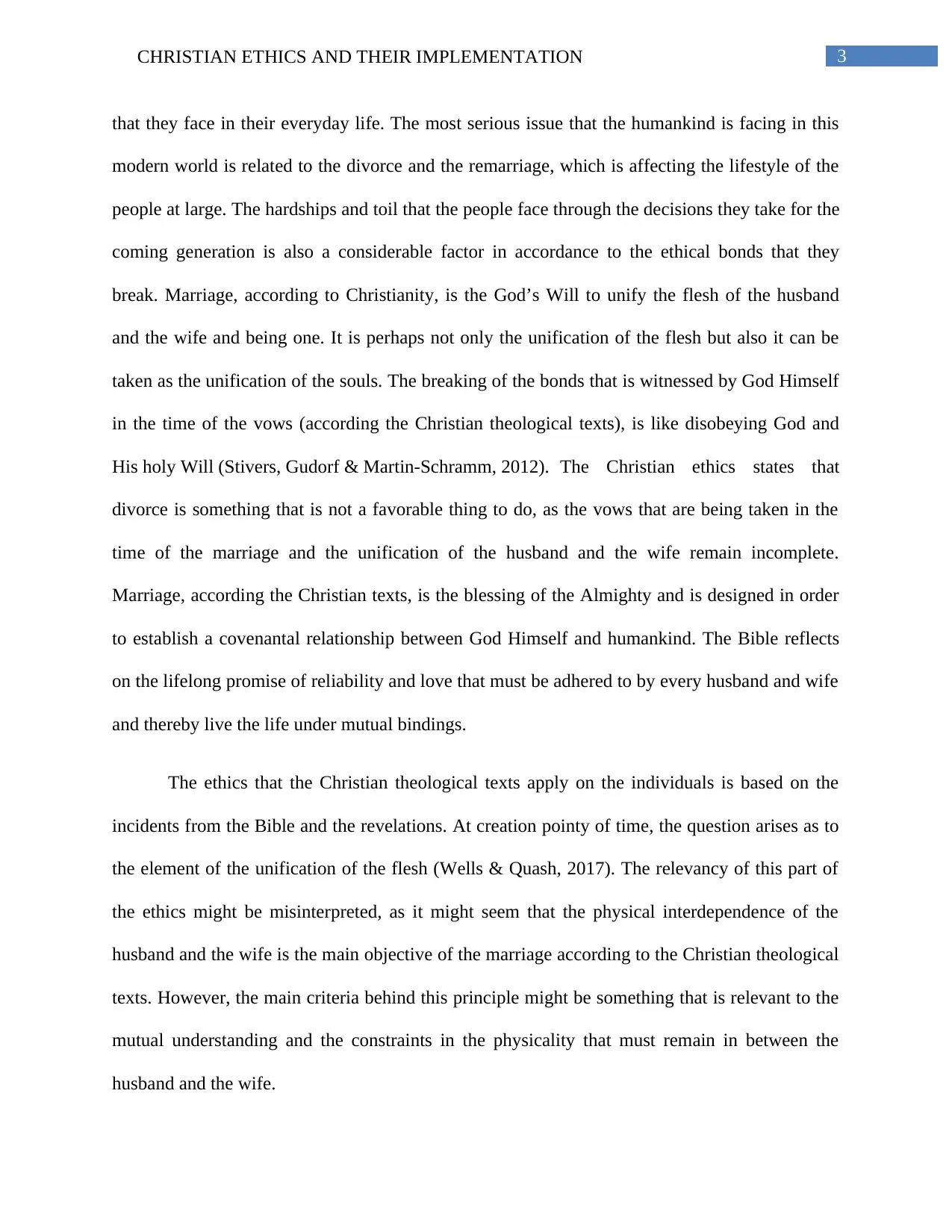
3CHRISTIAN ETHICS AND THEIR IMPLEMENTATION
that they face in their everyday life. The most serious issue that the humankind is facing in this
modern world is related to the divorce and the remarriage, which is affecting the lifestyle of the
people at large. The hardships and toil that the people face through the decisions they take for the
coming generation is also a considerable factor in accordance to the ethical bonds that they
break. Marriage, according to Christianity, is the God’s Will to unify the flesh of the husband
and the wife and being one. It is perhaps not only the unification of the flesh but also it can be
taken as the unification of the souls. The breaking of the bonds that is witnessed by God Himself
in the time of the vows (according the Christian theological texts), is like disobeying God and
His holy Will (Stivers, Gudorf & Martin-Schramm, 2012). The Christian ethics states that
divorce is something that is not a favorable thing to do, as the vows that are being taken in the
time of the marriage and the unification of the husband and the wife remain incomplete.
Marriage, according the Christian texts, is the blessing of the Almighty and is designed in order
to establish a covenantal relationship between God Himself and humankind. The Bible reflects
on the lifelong promise of reliability and love that must be adhered to by every husband and wife
and thereby live the life under mutual bindings.
The ethics that the Christian theological texts apply on the individuals is based on the
incidents from the Bible and the revelations. At creation pointy of time, the question arises as to
the element of the unification of the flesh (Wells & Quash, 2017). The relevancy of this part of
the ethics might be misinterpreted, as it might seem that the physical interdependence of the
husband and the wife is the main objective of the marriage according to the Christian theological
texts. However, the main criteria behind this principle might be something that is relevant to the
mutual understanding and the constraints in the physicality that must remain in between the
husband and the wife.
that they face in their everyday life. The most serious issue that the humankind is facing in this
modern world is related to the divorce and the remarriage, which is affecting the lifestyle of the
people at large. The hardships and toil that the people face through the decisions they take for the
coming generation is also a considerable factor in accordance to the ethical bonds that they
break. Marriage, according to Christianity, is the God’s Will to unify the flesh of the husband
and the wife and being one. It is perhaps not only the unification of the flesh but also it can be
taken as the unification of the souls. The breaking of the bonds that is witnessed by God Himself
in the time of the vows (according the Christian theological texts), is like disobeying God and
His holy Will (Stivers, Gudorf & Martin-Schramm, 2012). The Christian ethics states that
divorce is something that is not a favorable thing to do, as the vows that are being taken in the
time of the marriage and the unification of the husband and the wife remain incomplete.
Marriage, according the Christian texts, is the blessing of the Almighty and is designed in order
to establish a covenantal relationship between God Himself and humankind. The Bible reflects
on the lifelong promise of reliability and love that must be adhered to by every husband and wife
and thereby live the life under mutual bindings.
The ethics that the Christian theological texts apply on the individuals is based on the
incidents from the Bible and the revelations. At creation pointy of time, the question arises as to
the element of the unification of the flesh (Wells & Quash, 2017). The relevancy of this part of
the ethics might be misinterpreted, as it might seem that the physical interdependence of the
husband and the wife is the main objective of the marriage according to the Christian theological
texts. However, the main criteria behind this principle might be something that is relevant to the
mutual understanding and the constraints in the physicality that must remain in between the
husband and the wife.
Secure Best Marks with AI Grader
Need help grading? Try our AI Grader for instant feedback on your assignments.
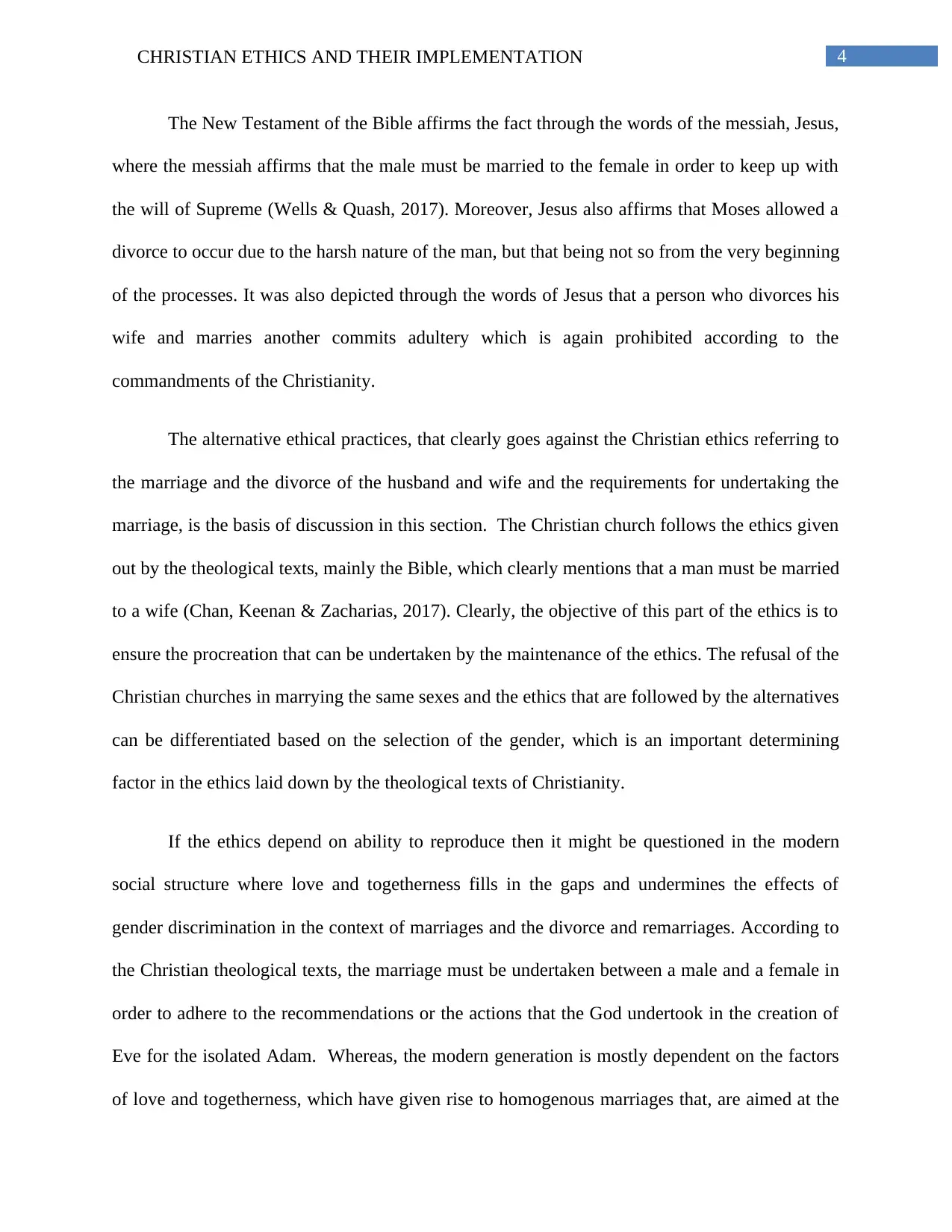
4CHRISTIAN ETHICS AND THEIR IMPLEMENTATION
The New Testament of the Bible affirms the fact through the words of the messiah, Jesus,
where the messiah affirms that the male must be married to the female in order to keep up with
the will of Supreme (Wells & Quash, 2017). Moreover, Jesus also affirms that Moses allowed a
divorce to occur due to the harsh nature of the man, but that being not so from the very beginning
of the processes. It was also depicted through the words of Jesus that a person who divorces his
wife and marries another commits adultery which is again prohibited according to the
commandments of the Christianity.
The alternative ethical practices, that clearly goes against the Christian ethics referring to
the marriage and the divorce of the husband and wife and the requirements for undertaking the
marriage, is the basis of discussion in this section. The Christian church follows the ethics given
out by the theological texts, mainly the Bible, which clearly mentions that a man must be married
to a wife (Chan, Keenan & Zacharias, 2017). Clearly, the objective of this part of the ethics is to
ensure the procreation that can be undertaken by the maintenance of the ethics. The refusal of the
Christian churches in marrying the same sexes and the ethics that are followed by the alternatives
can be differentiated based on the selection of the gender, which is an important determining
factor in the ethics laid down by the theological texts of Christianity.
If the ethics depend on ability to reproduce then it might be questioned in the modern
social structure where love and togetherness fills in the gaps and undermines the effects of
gender discrimination in the context of marriages and the divorce and remarriages. According to
the Christian theological texts, the marriage must be undertaken between a male and a female in
order to adhere to the recommendations or the actions that the God undertook in the creation of
Eve for the isolated Adam. Whereas, the modern generation is mostly dependent on the factors
of love and togetherness, which have given rise to homogenous marriages that, are aimed at the
The New Testament of the Bible affirms the fact through the words of the messiah, Jesus,
where the messiah affirms that the male must be married to the female in order to keep up with
the will of Supreme (Wells & Quash, 2017). Moreover, Jesus also affirms that Moses allowed a
divorce to occur due to the harsh nature of the man, but that being not so from the very beginning
of the processes. It was also depicted through the words of Jesus that a person who divorces his
wife and marries another commits adultery which is again prohibited according to the
commandments of the Christianity.
The alternative ethical practices, that clearly goes against the Christian ethics referring to
the marriage and the divorce of the husband and wife and the requirements for undertaking the
marriage, is the basis of discussion in this section. The Christian church follows the ethics given
out by the theological texts, mainly the Bible, which clearly mentions that a man must be married
to a wife (Chan, Keenan & Zacharias, 2017). Clearly, the objective of this part of the ethics is to
ensure the procreation that can be undertaken by the maintenance of the ethics. The refusal of the
Christian churches in marrying the same sexes and the ethics that are followed by the alternatives
can be differentiated based on the selection of the gender, which is an important determining
factor in the ethics laid down by the theological texts of Christianity.
If the ethics depend on ability to reproduce then it might be questioned in the modern
social structure where love and togetherness fills in the gaps and undermines the effects of
gender discrimination in the context of marriages and the divorce and remarriages. According to
the Christian theological texts, the marriage must be undertaken between a male and a female in
order to adhere to the recommendations or the actions that the God undertook in the creation of
Eve for the isolated Adam. Whereas, the modern generation is mostly dependent on the factors
of love and togetherness, which have given rise to homogenous marriages that, are aimed at the
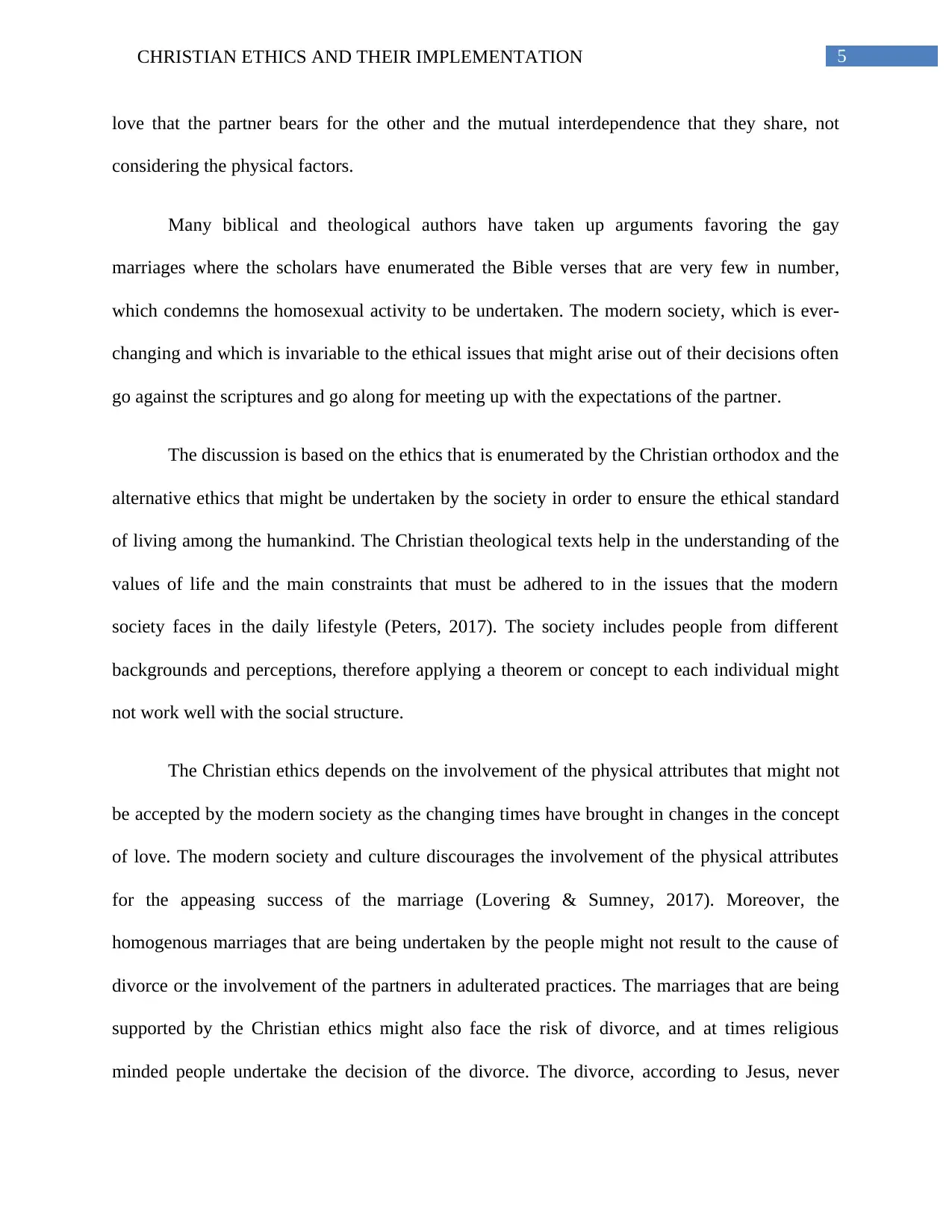
5CHRISTIAN ETHICS AND THEIR IMPLEMENTATION
love that the partner bears for the other and the mutual interdependence that they share, not
considering the physical factors.
Many biblical and theological authors have taken up arguments favoring the gay
marriages where the scholars have enumerated the Bible verses that are very few in number,
which condemns the homosexual activity to be undertaken. The modern society, which is ever-
changing and which is invariable to the ethical issues that might arise out of their decisions often
go against the scriptures and go along for meeting up with the expectations of the partner.
The discussion is based on the ethics that is enumerated by the Christian orthodox and the
alternative ethics that might be undertaken by the society in order to ensure the ethical standard
of living among the humankind. The Christian theological texts help in the understanding of the
values of life and the main constraints that must be adhered to in the issues that the modern
society faces in the daily lifestyle (Peters, 2017). The society includes people from different
backgrounds and perceptions, therefore applying a theorem or concept to each individual might
not work well with the social structure.
The Christian ethics depends on the involvement of the physical attributes that might not
be accepted by the modern society as the changing times have brought in changes in the concept
of love. The modern society and culture discourages the involvement of the physical attributes
for the appeasing success of the marriage (Lovering & Sumney, 2017). Moreover, the
homogenous marriages that are being undertaken by the people might not result to the cause of
divorce or the involvement of the partners in adulterated practices. The marriages that are being
supported by the Christian ethics might also face the risk of divorce, and at times religious
minded people undertake the decision of the divorce. The divorce, according to Jesus, never
love that the partner bears for the other and the mutual interdependence that they share, not
considering the physical factors.
Many biblical and theological authors have taken up arguments favoring the gay
marriages where the scholars have enumerated the Bible verses that are very few in number,
which condemns the homosexual activity to be undertaken. The modern society, which is ever-
changing and which is invariable to the ethical issues that might arise out of their decisions often
go against the scriptures and go along for meeting up with the expectations of the partner.
The discussion is based on the ethics that is enumerated by the Christian orthodox and the
alternative ethics that might be undertaken by the society in order to ensure the ethical standard
of living among the humankind. The Christian theological texts help in the understanding of the
values of life and the main constraints that must be adhered to in the issues that the modern
society faces in the daily lifestyle (Peters, 2017). The society includes people from different
backgrounds and perceptions, therefore applying a theorem or concept to each individual might
not work well with the social structure.
The Christian ethics depends on the involvement of the physical attributes that might not
be accepted by the modern society as the changing times have brought in changes in the concept
of love. The modern society and culture discourages the involvement of the physical attributes
for the appeasing success of the marriage (Lovering & Sumney, 2017). Moreover, the
homogenous marriages that are being undertaken by the people might not result to the cause of
divorce or the involvement of the partners in adulterated practices. The marriages that are being
supported by the Christian ethics might also face the risk of divorce, and at times religious
minded people undertake the decision of the divorce. The divorce, according to Jesus, never
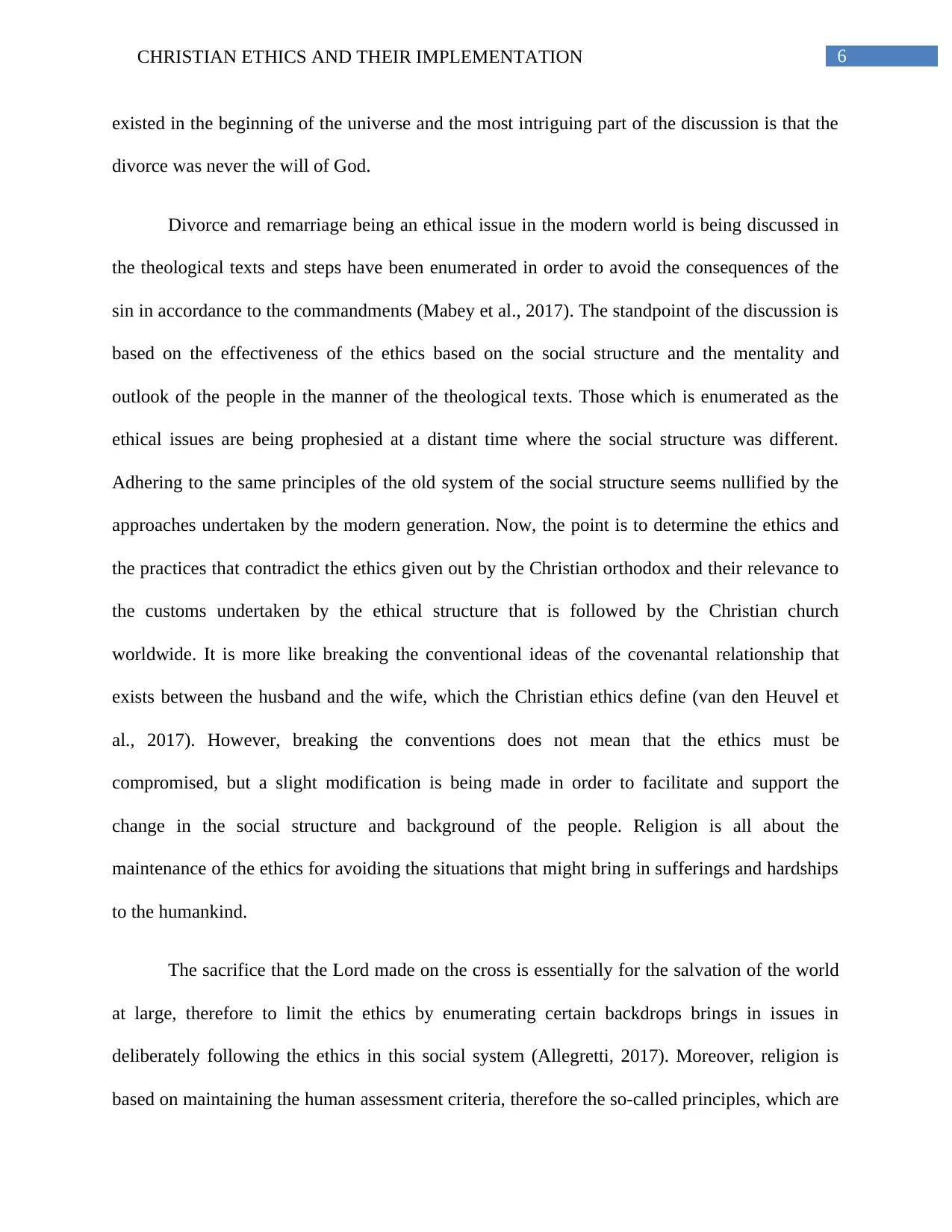
6CHRISTIAN ETHICS AND THEIR IMPLEMENTATION
existed in the beginning of the universe and the most intriguing part of the discussion is that the
divorce was never the will of God.
Divorce and remarriage being an ethical issue in the modern world is being discussed in
the theological texts and steps have been enumerated in order to avoid the consequences of the
sin in accordance to the commandments (Mabey et al., 2017). The standpoint of the discussion is
based on the effectiveness of the ethics based on the social structure and the mentality and
outlook of the people in the manner of the theological texts. Those which is enumerated as the
ethical issues are being prophesied at a distant time where the social structure was different.
Adhering to the same principles of the old system of the social structure seems nullified by the
approaches undertaken by the modern generation. Now, the point is to determine the ethics and
the practices that contradict the ethics given out by the Christian orthodox and their relevance to
the customs undertaken by the ethical structure that is followed by the Christian church
worldwide. It is more like breaking the conventional ideas of the covenantal relationship that
exists between the husband and the wife, which the Christian ethics define (van den Heuvel et
al., 2017). However, breaking the conventions does not mean that the ethics must be
compromised, but a slight modification is being made in order to facilitate and support the
change in the social structure and background of the people. Religion is all about the
maintenance of the ethics for avoiding the situations that might bring in sufferings and hardships
to the humankind.
The sacrifice that the Lord made on the cross is essentially for the salvation of the world
at large, therefore to limit the ethics by enumerating certain backdrops brings in issues in
deliberately following the ethics in this social system (Allegretti, 2017). Moreover, religion is
based on maintaining the human assessment criteria, therefore the so-called principles, which are
existed in the beginning of the universe and the most intriguing part of the discussion is that the
divorce was never the will of God.
Divorce and remarriage being an ethical issue in the modern world is being discussed in
the theological texts and steps have been enumerated in order to avoid the consequences of the
sin in accordance to the commandments (Mabey et al., 2017). The standpoint of the discussion is
based on the effectiveness of the ethics based on the social structure and the mentality and
outlook of the people in the manner of the theological texts. Those which is enumerated as the
ethical issues are being prophesied at a distant time where the social structure was different.
Adhering to the same principles of the old system of the social structure seems nullified by the
approaches undertaken by the modern generation. Now, the point is to determine the ethics and
the practices that contradict the ethics given out by the Christian orthodox and their relevance to
the customs undertaken by the ethical structure that is followed by the Christian church
worldwide. It is more like breaking the conventional ideas of the covenantal relationship that
exists between the husband and the wife, which the Christian ethics define (van den Heuvel et
al., 2017). However, breaking the conventions does not mean that the ethics must be
compromised, but a slight modification is being made in order to facilitate and support the
change in the social structure and background of the people. Religion is all about the
maintenance of the ethics for avoiding the situations that might bring in sufferings and hardships
to the humankind.
The sacrifice that the Lord made on the cross is essentially for the salvation of the world
at large, therefore to limit the ethics by enumerating certain backdrops brings in issues in
deliberately following the ethics in this social system (Allegretti, 2017). Moreover, religion is
based on maintaining the human assessment criteria, therefore the so-called principles, which are
Paraphrase This Document
Need a fresh take? Get an instant paraphrase of this document with our AI Paraphraser
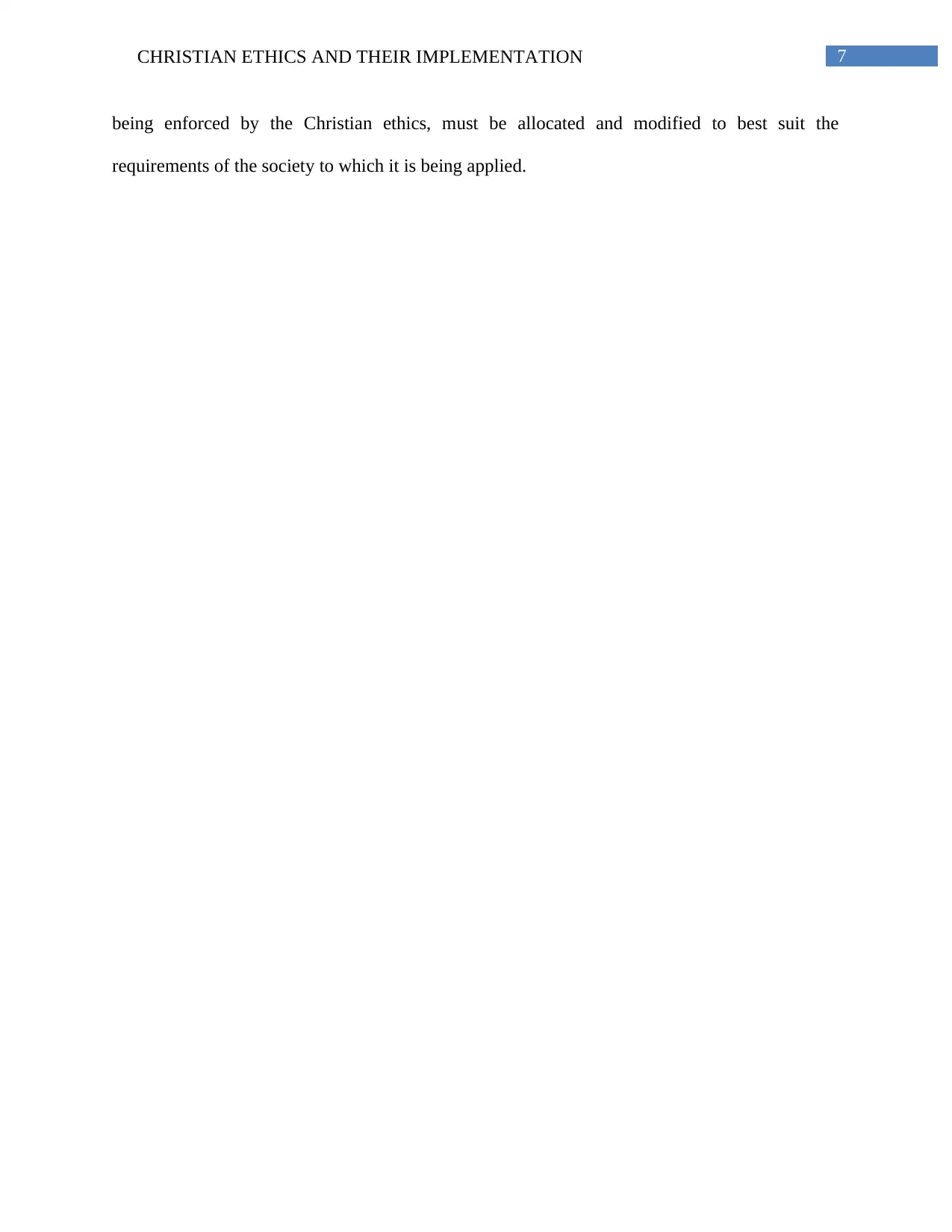
7CHRISTIAN ETHICS AND THEIR IMPLEMENTATION
being enforced by the Christian ethics, must be allocated and modified to best suit the
requirements of the society to which it is being applied.
being enforced by the Christian ethics, must be allocated and modified to best suit the
requirements of the society to which it is being applied.
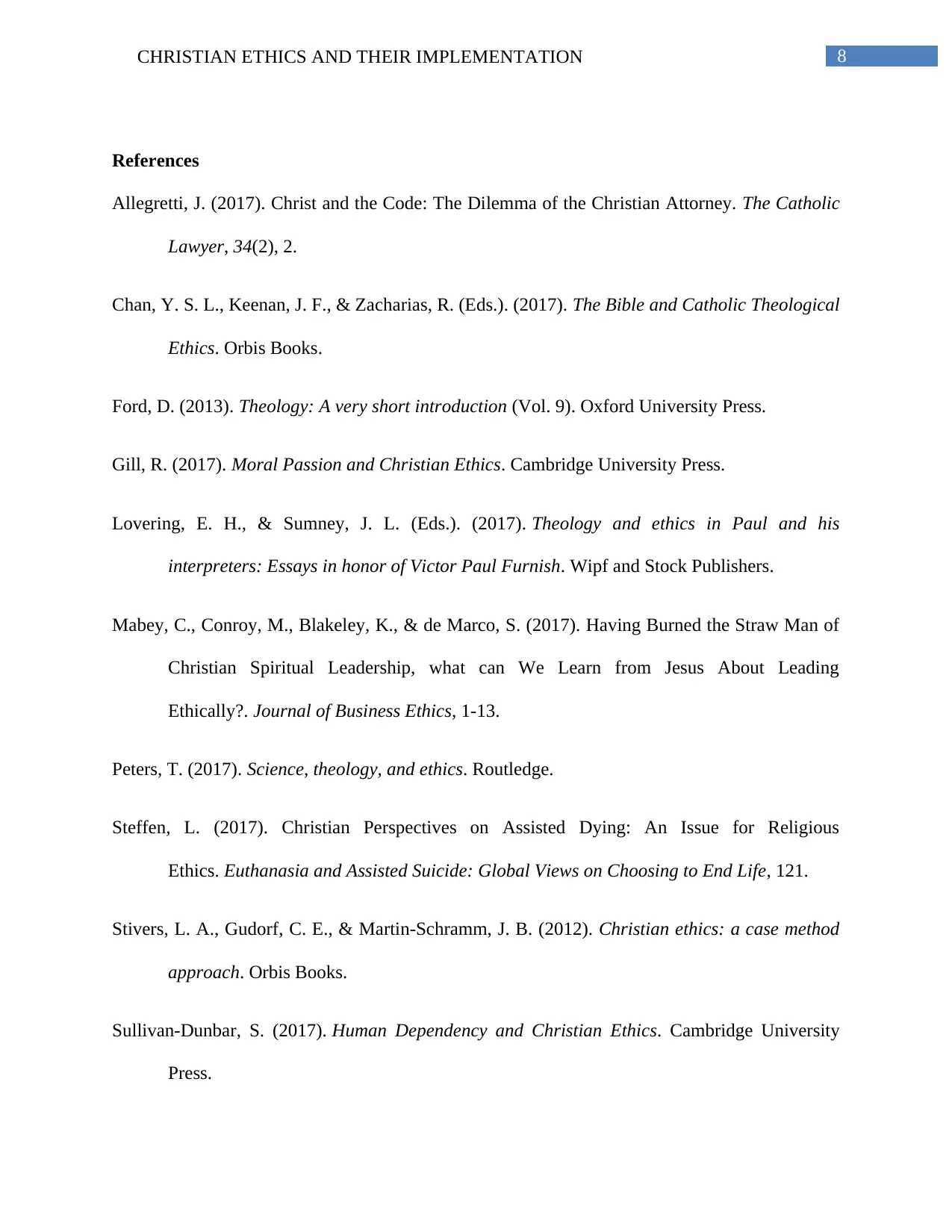
8CHRISTIAN ETHICS AND THEIR IMPLEMENTATION
References
Allegretti, J. (2017). Christ and the Code: The Dilemma of the Christian Attorney. The Catholic
Lawyer, 34(2), 2.
Chan, Y. S. L., Keenan, J. F., & Zacharias, R. (Eds.). (2017). The Bible and Catholic Theological
Ethics. Orbis Books.
Ford, D. (2013). Theology: A very short introduction (Vol. 9). Oxford University Press.
Gill, R. (2017). Moral Passion and Christian Ethics. Cambridge University Press.
Lovering, E. H., & Sumney, J. L. (Eds.). (2017). Theology and ethics in Paul and his
interpreters: Essays in honor of Victor Paul Furnish. Wipf and Stock Publishers.
Mabey, C., Conroy, M., Blakeley, K., & de Marco, S. (2017). Having Burned the Straw Man of
Christian Spiritual Leadership, what can We Learn from Jesus About Leading
Ethically?. Journal of Business Ethics, 1-13.
Peters, T. (2017). Science, theology, and ethics. Routledge.
Steffen, L. (2017). Christian Perspectives on Assisted Dying: An Issue for Religious
Ethics. Euthanasia and Assisted Suicide: Global Views on Choosing to End Life, 121.
Stivers, L. A., Gudorf, C. E., & Martin-Schramm, J. B. (2012). Christian ethics: a case method
approach. Orbis Books.
Sullivan-Dunbar, S. (2017). Human Dependency and Christian Ethics. Cambridge University
Press.
References
Allegretti, J. (2017). Christ and the Code: The Dilemma of the Christian Attorney. The Catholic
Lawyer, 34(2), 2.
Chan, Y. S. L., Keenan, J. F., & Zacharias, R. (Eds.). (2017). The Bible and Catholic Theological
Ethics. Orbis Books.
Ford, D. (2013). Theology: A very short introduction (Vol. 9). Oxford University Press.
Gill, R. (2017). Moral Passion and Christian Ethics. Cambridge University Press.
Lovering, E. H., & Sumney, J. L. (Eds.). (2017). Theology and ethics in Paul and his
interpreters: Essays in honor of Victor Paul Furnish. Wipf and Stock Publishers.
Mabey, C., Conroy, M., Blakeley, K., & de Marco, S. (2017). Having Burned the Straw Man of
Christian Spiritual Leadership, what can We Learn from Jesus About Leading
Ethically?. Journal of Business Ethics, 1-13.
Peters, T. (2017). Science, theology, and ethics. Routledge.
Steffen, L. (2017). Christian Perspectives on Assisted Dying: An Issue for Religious
Ethics. Euthanasia and Assisted Suicide: Global Views on Choosing to End Life, 121.
Stivers, L. A., Gudorf, C. E., & Martin-Schramm, J. B. (2012). Christian ethics: a case method
approach. Orbis Books.
Sullivan-Dunbar, S. (2017). Human Dependency and Christian Ethics. Cambridge University
Press.
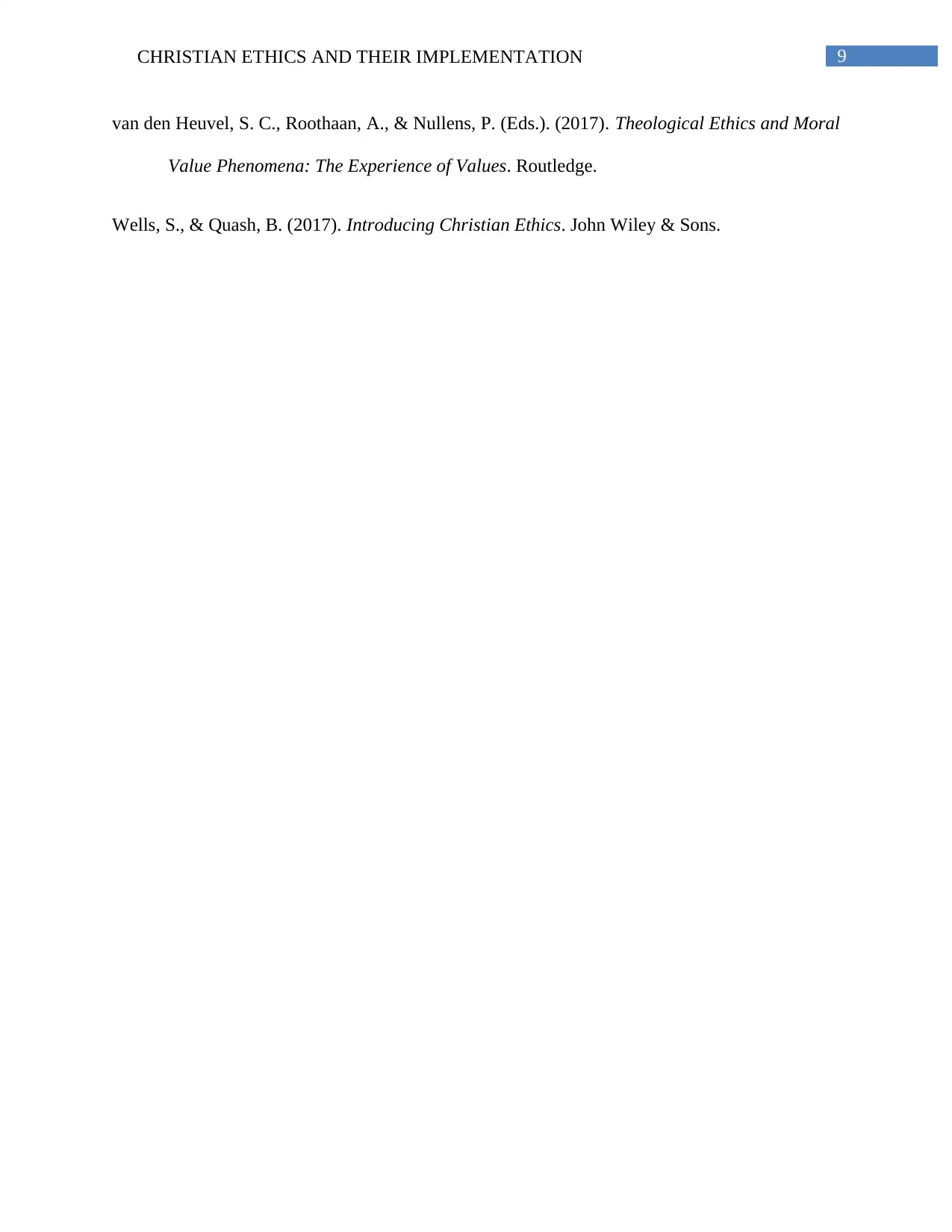
9CHRISTIAN ETHICS AND THEIR IMPLEMENTATION
van den Heuvel, S. C., Roothaan, A., & Nullens, P. (Eds.). (2017). Theological Ethics and Moral
Value Phenomena: The Experience of Values. Routledge.
Wells, S., & Quash, B. (2017). Introducing Christian Ethics. John Wiley & Sons.
van den Heuvel, S. C., Roothaan, A., & Nullens, P. (Eds.). (2017). Theological Ethics and Moral
Value Phenomena: The Experience of Values. Routledge.
Wells, S., & Quash, B. (2017). Introducing Christian Ethics. John Wiley & Sons.
1 out of 10
Your All-in-One AI-Powered Toolkit for Academic Success.
+13062052269
info@desklib.com
Available 24*7 on WhatsApp / Email
![[object Object]](/_next/static/media/star-bottom.7253800d.svg)
Unlock your academic potential
© 2024 | Zucol Services PVT LTD | All rights reserved.